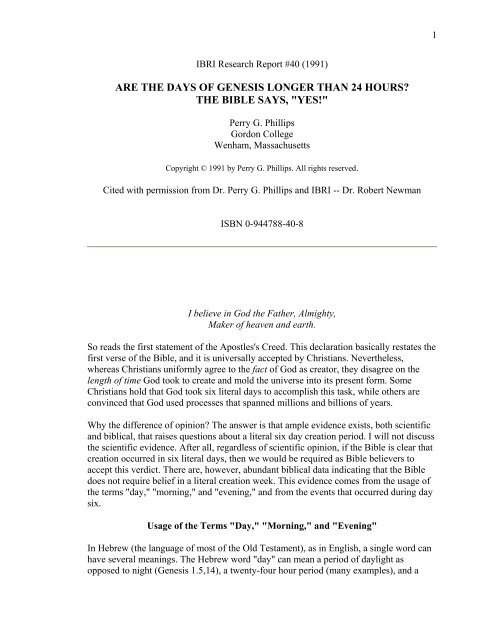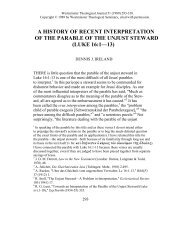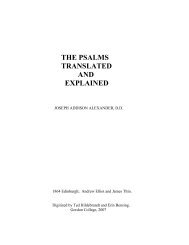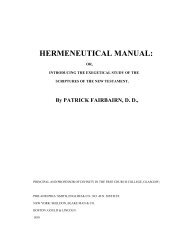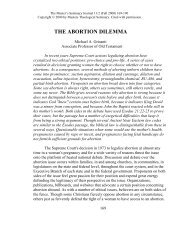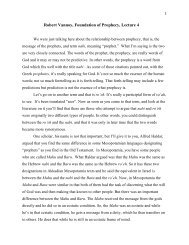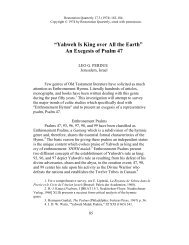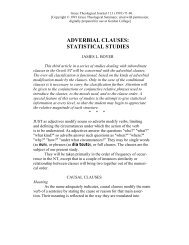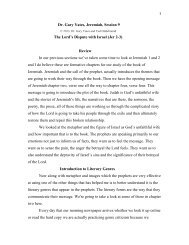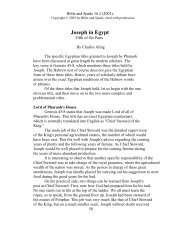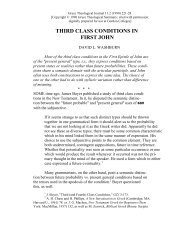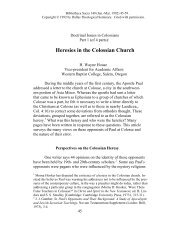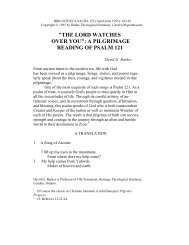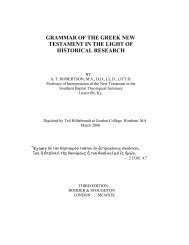Are the Days of Genesis Longer than 24 hours? - Gordon College ...
Are the Days of Genesis Longer than 24 hours? - Gordon College ...
Are the Days of Genesis Longer than 24 hours? - Gordon College ...
You also want an ePaper? Increase the reach of your titles
YUMPU automatically turns print PDFs into web optimized ePapers that Google loves.
1<br />
IBRI Research Report #40 (1991)<br />
ARE THE DAYS OF GENESIS LONGER THAN <strong>24</strong> HOURS?<br />
THE BIBLE SAYS, "YES!"<br />
Perry G. Phillips<br />
<strong>Gordon</strong> <strong>College</strong><br />
Wenham, Massachusetts<br />
Copyright © 1991 by Perry G. Phillips. All rights reserved.<br />
Cited with permission from Dr. Perry G. Phillips and IBRI -- Dr. Robert Newman<br />
ISBN 0-944788-40-8<br />
I believe in God <strong>the</strong> Fa<strong>the</strong>r, Almighty,<br />
Maker <strong>of</strong> heaven and earth.<br />
So reads <strong>the</strong> first statement <strong>of</strong> <strong>the</strong> Apostles's Creed. This declaration basically restates <strong>the</strong><br />
first verse <strong>of</strong> <strong>the</strong> Bible, and it is universally accepted by Christians. Never<strong>the</strong>less,<br />
whereas Christians uniformly agree to <strong>the</strong> fact <strong>of</strong> God as creator, <strong>the</strong>y disagree on <strong>the</strong><br />
length <strong>of</strong> time God took to create and mold <strong>the</strong> universe into its present form. Some<br />
Christians hold that God took six literal days to accomplish this task, while o<strong>the</strong>rs are<br />
convinced that God used processes that spanned millions and billions <strong>of</strong> years.<br />
Why <strong>the</strong> difference <strong>of</strong> opinion? The answer is that ample evidence exists, both scientific<br />
and biblical, that raises questions about a literal six day creation period. I will not discuss<br />
<strong>the</strong> scientific evidence. After all, regardless <strong>of</strong> scientific opinion, if <strong>the</strong> Bible is clear that<br />
creation occurred in six literal days, <strong>the</strong>n we would be required as Bible believers to<br />
accept this verdict. There are, however, abundant biblical data indicating that <strong>the</strong> Bible<br />
does not require belief in a literal creation week. This evidence comes from <strong>the</strong> usage <strong>of</strong><br />
<strong>the</strong> terms "day," "morning," and "evening," and from <strong>the</strong> events that occurred during day<br />
six.<br />
Usage <strong>of</strong> <strong>the</strong> Terms "Day," "Morning," and "Evening"<br />
In Hebrew (<strong>the</strong> language <strong>of</strong> most <strong>of</strong> <strong>the</strong> Old Testament), as in English, a single word can<br />
have several meanings. The Hebrew word "day" can mean a period <strong>of</strong> daylight as<br />
opposed to night (<strong>Genesis</strong> 1.5,14), a twenty-four hour period (many examples), and a
2<br />
period <strong>of</strong> time <strong>of</strong> unspecified length. The last usage, which is figurative, occurs many<br />
times in <strong>the</strong> Old Testament. An example appears in <strong>the</strong> creation account itself: "These are<br />
<strong>the</strong> generations <strong>of</strong> <strong>the</strong> heavens and <strong>of</strong> <strong>the</strong> earth when <strong>the</strong>y were created, in <strong>the</strong> day that <strong>the</strong><br />
Lord made <strong>the</strong> earth and <strong>the</strong> heavens" (<strong>Genesis</strong> 2.4). As we can see from this verse,<br />
regardless <strong>of</strong> <strong>the</strong> meaning <strong>of</strong> "day" in <strong>Genesis</strong> chapter one, scripture uses "day" for <strong>the</strong><br />
entire week <strong>of</strong> creation, <strong>the</strong>reby illustrating <strong>the</strong> figurative meaning <strong>of</strong> <strong>the</strong> word.<br />
At first, this may seem strange, for English speakers do not <strong>of</strong>ten use "day" figuratively.<br />
It does, never<strong>the</strong>less, appear at times in expressions like "back in my day," "in this day<br />
and age," and "in <strong>the</strong> days <strong>of</strong> FDR." It should be noted that <strong>the</strong> plural form "days" occurs<br />
figuratively numerous times in Hebrew. In fact, consulting a concordance will show that<br />
about a quarter <strong>of</strong> all <strong>the</strong> uses <strong>of</strong> "day" and "days" are figurative. Hence <strong>the</strong>re is no doubt<br />
that "day/days" can denote a period <strong>of</strong> time longer <strong>than</strong> twenty-four <strong>hours</strong>.<br />
On <strong>the</strong> o<strong>the</strong>r hand, what about <strong>the</strong> terms "morning" and "evening"? Does not <strong>the</strong>ir use in<br />
conjunction with "day" streng<strong>the</strong>n <strong>the</strong> literal interpretation <strong>of</strong> "day?" The answer is "no,"<br />
because Hebrew also uses "morning" and "evening" figuratively. For example, we read in<br />
Psalm 90, attributed to Moses, that human beings are like <strong>the</strong> grass that "though in <strong>the</strong><br />
morning it springs up new, by evening it is dry and wi<strong>the</strong>red" (verse 6). I know <strong>of</strong> no<br />
grass that literally springs up in <strong>the</strong> morning and <strong>the</strong>n is dead by <strong>the</strong> same evening.<br />
Ra<strong>the</strong>r, <strong>the</strong> psalmist has in mind <strong>the</strong> life cycle <strong>of</strong> grass in <strong>the</strong> Levant, which begins its<br />
growth with <strong>the</strong> November rains and dies with <strong>the</strong> hot, dry, March, desert winds. In this<br />
psalm, <strong>the</strong>refore, "morning" stands for <strong>the</strong> period <strong>of</strong> growth and "evening" stands for <strong>the</strong><br />
period <strong>of</strong> death. This interpretation fits in with <strong>the</strong> tenor <strong>of</strong> <strong>the</strong> entire psalm which<br />
encourages humans to be mindful <strong>of</strong> <strong>the</strong>ir time on earth; for just as <strong>the</strong> life cycle <strong>of</strong> grass<br />
is short with respect to human life, human life itself is short with respect to <strong>the</strong> ongoing<br />
activities <strong>of</strong> God. The same comparison is made between humans and grass in Isaiah<br />
40.6-8 and 1 Peter 1.<strong>24</strong>,25.<br />
"Morning" and "evening" are also used figuratively in Psalm 30.5. In this verse we read<br />
that God's anger "lasts only a moment, but his favor lasts a lifetime; weeping may remain<br />
for a night [literally: evening], but rejoicing comes in <strong>the</strong> morning ." In context,<br />
"evening" corresponds to <strong>the</strong> time <strong>of</strong> weeping over God's anger, and "morning"<br />
corresponds to <strong>the</strong> time <strong>of</strong> rejoicing over God's favor. The writer envisions a time longer<br />
<strong>than</strong> a literal morning or evening.<br />
Finally, we read in Psalm 49.14,15 that <strong>the</strong> wicked are<br />
like sheep ... destined for <strong>the</strong> grave, and death will feed on <strong>the</strong>m. The upright will rule<br />
over <strong>the</strong>m<br />
in <strong>the</strong> morning; <strong>the</strong>ir forms will decay in <strong>the</strong> grave far from <strong>the</strong>ir princely mansions. But<br />
God will<br />
redeem my soul from <strong>the</strong> grave; he will surely take me to himself.<br />
Again, "morning" must be interpreted figuratively, for in what way can <strong>the</strong> upright<br />
literally rule over <strong>the</strong> dead <strong>the</strong> morning after <strong>the</strong>y die? After all, one rules over those who
3<br />
are alive, not over those who are dead. I would suggest that <strong>the</strong> psalmist is looking ahead<br />
to <strong>the</strong> time <strong>of</strong> his ultimate redemption -- his resurrection -- spoken <strong>of</strong> in verse 15. In<br />
short, he is looking forward to a new age that he calls "morning."<br />
As with <strong>the</strong> word "day," English speakers do not regularly use "morning" and "evening"<br />
figuratively, but perhaps <strong>the</strong> expressions "<strong>the</strong> dawning <strong>of</strong> a new age" and "in <strong>the</strong> twilight<br />
<strong>of</strong> his/her years" parallel <strong>the</strong> Hebrew idiom that uses portions <strong>of</strong> a day figuratively for<br />
periods <strong>of</strong> time.<br />
In summary, we find evidence from <strong>the</strong> biblical usage <strong>of</strong> <strong>the</strong> terms "day," "morning," and<br />
"evening" that <strong>the</strong> "days" <strong>of</strong> <strong>the</strong> first chapter <strong>of</strong> <strong>Genesis</strong> may not be literal. If not, <strong>the</strong>n<br />
what do <strong>the</strong> terms mean? I would suggest <strong>the</strong> following: "Evening" represents <strong>the</strong> waning<br />
<strong>of</strong> one "day's" creative activity and "morning" represents <strong>the</strong> beginning <strong>of</strong> <strong>the</strong> next<br />
"day's" creative activity. This activity has taken place in a period <strong>of</strong> time called a "day."<br />
The argument for figurative days will be reinforced when we consider <strong>the</strong> events that<br />
occurred on <strong>the</strong> sixth day.<br />
The Events <strong>of</strong> <strong>the</strong> Sixth Day<br />
In <strong>Genesis</strong> 1.27 it appears that man and woman were created at <strong>the</strong> same time, but in<br />
<strong>Genesis</strong> chapter two we learn that a period <strong>of</strong> time elapsed between <strong>the</strong> creation <strong>of</strong> <strong>the</strong><br />
man and that <strong>of</strong> <strong>the</strong> woman. This is not a contradiction. Chapter one only gives an<br />
overview <strong>of</strong> <strong>the</strong> creation <strong>of</strong> human beings, whereas chapter two fills in <strong>the</strong> details. Let us<br />
examine each detail while asking ourselves if all <strong>the</strong> events presented in chapter two<br />
could reasonably fit into twenty-four <strong>hours</strong>.<br />
First, after Adam was created, God planted <strong>the</strong> garden <strong>of</strong> Eden in <strong>the</strong> east. He <strong>the</strong>n made<br />
all kinds <strong>of</strong> trees grow out <strong>of</strong> <strong>the</strong> ground. At this point we have to pay very careful<br />
attention to <strong>the</strong> terminology describing God's activities. Notice that we are not told that<br />
God "created" <strong>the</strong> garden or <strong>the</strong> trees. Ra<strong>the</strong>r, God "planted" and "caused <strong>the</strong> trees to<br />
grow." The terms "planted" and "grow" imply activity that took time. Of course, God has<br />
<strong>the</strong> power to create Eden in an instant, but <strong>the</strong> language <strong>of</strong> <strong>the</strong> narrative suggests a<br />
process, not an immediate creative act.<br />
Second, in spite <strong>of</strong> <strong>the</strong> garden's perfection, it could not take care <strong>of</strong> itself; man still<br />
needed "to work it and to take care <strong>of</strong> it." (verse 15) The nature <strong>of</strong> <strong>the</strong> work is not stated,<br />
but one wonders why <strong>the</strong> garden needed any work at all if <strong>the</strong> sixth day was only twentyfour<br />
<strong>hours</strong>. Could not <strong>the</strong> garden take care <strong>of</strong> itself for such a short period? Again, <strong>the</strong><br />
narrative implies a time longer <strong>than</strong> a literal day, unless <strong>the</strong> command was given at this<br />
time but was meant to be fulfilled at a later date. The perception is, however, that Adam<br />
was to begin his work forthwith.<br />
Third, in verse 18 <strong>the</strong> Lord declares that "It is not good for <strong>the</strong> man to be alone. I will<br />
make a helper suitable for him." The Lord, however, did not create Eve immediately.<br />
Instead, he brought <strong>the</strong> beasts <strong>of</strong> <strong>the</strong> field and <strong>the</strong> birds <strong>of</strong> <strong>the</strong> air to Adam to name <strong>the</strong>m,
4<br />
which he did. This naming process would have taken time, both because <strong>the</strong>re were many<br />
kinds <strong>of</strong> animals, and because names in <strong>the</strong> Bible describe a characteristic <strong>of</strong> <strong>the</strong> object<br />
being named. Note, for example, that <strong>the</strong> name "woman" is not arbitrary; it brings out a<br />
characteristic <strong>of</strong> woman -- "she was taken out <strong>of</strong> man." (verse 23) Note also <strong>the</strong> meanings<br />
<strong>of</strong> "Cain" and "Seth" in <strong>Genesis</strong> 4.1,25. From <strong>the</strong>se and o<strong>the</strong>r scriptural examples, it is<br />
not unreasonable that Adam's name for each animal would have expressed a characteristic<br />
<strong>of</strong> <strong>the</strong> animal, and this implies that Adam would have had to observe each animal<br />
for a while in order to select a name that summarized one <strong>of</strong> its characteristics. Thus it is<br />
hard to believe that Adam could have named all <strong>the</strong> beasts <strong>of</strong> <strong>the</strong> field and <strong>the</strong> birds <strong>of</strong> <strong>the</strong><br />
air in twenty-four <strong>hours</strong>.<br />
Of course, one wonders why <strong>the</strong> Lord had Adam name <strong>the</strong> animals before He created <strong>the</strong><br />
woman. I would suggest that God's purpose was to show Adam that he was incomplete<br />
without a mate (after all, <strong>the</strong> o<strong>the</strong>r animals had mates); in this way he would love and<br />
appreciate Eve all <strong>the</strong> more.<br />
The final evidence that <strong>the</strong> sixth day was longer <strong>than</strong> twenty- four <strong>hours</strong> comes from<br />
Adam's expression after he sees Eve: "This is now bone <strong>of</strong> my bones and flesh <strong>of</strong> my<br />
flesh." The English translation "this is now" misses <strong>the</strong> emphasis which belongs to <strong>the</strong><br />
word used in <strong>the</strong> original Hebrew. A better rendering would be "now at length" or "now<br />
at last," as we can see by tracing <strong>the</strong> use <strong>of</strong> this word in o<strong>the</strong>r portions <strong>of</strong> <strong>the</strong> Old<br />
Testament.<br />
Uses <strong>of</strong> "This is now":<br />
1. <strong>Genesis</strong> 18.32: As Abraham argues with <strong>the</strong> Lord about <strong>the</strong> impending<br />
destruction <strong>of</strong> Sodom, he ends <strong>the</strong> long bargaining session by asking <strong>the</strong> Lord not<br />
to be angry "this time," or "now at last," when he requests that Sodom not be<br />
destroyed if only ten righteous individuals are found within <strong>the</strong> city.<br />
2. <strong>Genesis</strong> 29.34,35: Leah uses this expression after <strong>the</strong> birth <strong>of</strong> her sons Levi and<br />
Judah. Recall that Leah was not loved by Jacob, but she felt that now she would<br />
be loved after giving birth to <strong>the</strong>se two sons.<br />
3. <strong>Genesis</strong> 30.20: Again, <strong>the</strong> expression is used by Leah after <strong>the</strong> birth <strong>of</strong> Zebulun.<br />
4. <strong>Genesis</strong> 46.30: For many years Israel (Jacob) thought that his beloved son<br />
Joseph was dead, but finally he learns that Joseph was alive in Egypt. Upon<br />
seeing his son, Israel states, "Now I am ready to die, since I have seen for myself<br />
that you are still alive." The word "now" is <strong>the</strong> same word used by Adam in<br />
<strong>Genesis</strong> 2.23.<br />
5. Exodus 9.27: After <strong>the</strong> seventh plague, Pharaoh urges Moses to end <strong>the</strong> plague<br />
by declaring, "This time I have sinned." The expression "this time" is <strong>the</strong> same<br />
word used in <strong>Genesis</strong> 2.23.
5<br />
6. Exodus 10.17: Again, after <strong>the</strong> eighth plague, Pharaoh tries <strong>the</strong> same tactic as<br />
before.<br />
7. Judges 6.39: Our expression is used twice by Gideon when requesting that<br />
"now at last" <strong>the</strong> Lord not be angry with him for asking that <strong>the</strong> dew avoid <strong>the</strong><br />
fleece and condense on <strong>the</strong> ground.<br />
8. Judges 15.3: Samson had experienced a time <strong>of</strong> contention with <strong>the</strong> Philistines<br />
which ended in his leaving his wife with her fa<strong>the</strong>r and returning to <strong>the</strong> land <strong>of</strong><br />
Israel. Some time later, Samson returned to his wife's house only to find that she<br />
was given to ano<strong>the</strong>r man. Samson responds by declaring that "this time," or "now<br />
at last" he has a right to get even with <strong>the</strong> Philistines.<br />
9. Judges 16.18: Samson finally succumbs to Deli- lah's enticements and he<br />
confesses to her <strong>the</strong> source <strong>of</strong> his strength. Delilah calls <strong>the</strong> Philistine leaders to<br />
come "this time," for he told her everything.<br />
10. Judges 16.28: After Samson was taken to <strong>the</strong> temple to be mocked by <strong>the</strong><br />
Philistines, he asks God "now at last" to give him <strong>the</strong> strength to bring down <strong>the</strong><br />
temple.<br />
In each instance above, except for Abraham and Gideon, <strong>the</strong> narrative relates a series <strong>of</strong><br />
events that lasted longer <strong>than</strong> twenty-four <strong>hours</strong>. In some cases, a considerable period <strong>of</strong><br />
time elapsed. That is why <strong>the</strong> term is better translated "now at last." It is difficult,<br />
<strong>the</strong>refore, to believe that Adam would use this expression if only a fraction <strong>of</strong> a day<br />
passed between his creation and that <strong>of</strong> Eve's. Unlike Abraham or Gideon, Adam was<br />
nei<strong>the</strong>r arguing with God nor seeking a sign; his use <strong>of</strong> "now at last" parallels those<br />
which involve a longer period <strong>of</strong> time. In Adam's case, this period included <strong>the</strong> naming <strong>of</strong><br />
<strong>the</strong> animals and <strong>the</strong> recognition that he was incomplete without a mate. Surely <strong>the</strong>se<br />
events took longer <strong>than</strong> a day. And if <strong>the</strong> sixth day was not a twenty-four hour period,<br />
what right do we have to insist that any o<strong>the</strong>r day <strong>of</strong> creation was twenty-four <strong>hours</strong>?<br />
We have seen two powerful evidences that <strong>the</strong> "days" <strong>of</strong> <strong>Genesis</strong> are figurative. First, we<br />
have investigated <strong>the</strong> usage <strong>of</strong> <strong>the</strong> terms "day," "morning," and "evening," and we have<br />
seen that <strong>the</strong>se terms can be used figuratively. Second, we have examined <strong>the</strong><br />
terminology used to describe <strong>the</strong> activities <strong>of</strong> <strong>the</strong> sixth day, and we find substantial<br />
testimony that <strong>the</strong> events <strong>of</strong> <strong>the</strong> sixth day do not fit into twenty-four <strong>hours</strong>.<br />
We conclude that scripture itself attests that <strong>the</strong> "days" <strong>of</strong> <strong>Genesis</strong> need not be taken<br />
literally.
6<br />
Appendix: Two Common Arguments against <strong>the</strong> Non-literal View<br />
One argument <strong>of</strong>ten encountered is as follows: In all instances outside <strong>of</strong> <strong>Genesis</strong> one,<br />
when a number appears with <strong>the</strong> term "day," a literal day is meant. Because a number<br />
appears with <strong>the</strong> days <strong>of</strong> <strong>Genesis</strong> one, <strong>the</strong>y must be literal.<br />
This argument fails on two counts. First, <strong>the</strong> premise is false. There are at least two<br />
instances where a number appears with a figurative use <strong>of</strong> "day," Isaiah 9.14 (9.13 in<br />
Hebrew) and Hosea 6.2. In <strong>the</strong> Isaiah passage, <strong>the</strong> expression "one day" is exactly <strong>the</strong><br />
same in Hebrew as <strong>the</strong> one <strong>of</strong>ten translated as "<strong>the</strong> first day" in <strong>Genesis</strong> 1.5. "One day" in<br />
this passage, as well as <strong>the</strong> numbered "days" in Hosea, are clearly figurative.<br />
Second, in all cases purportedly illustrating <strong>the</strong> number/lite- ral day correlation, it is<br />
already apparent from <strong>the</strong> context that a literal day is intended. The number is simply<br />
descriptive; it does not define "day." Hence <strong>the</strong> proposed connection between <strong>the</strong><br />
presence <strong>of</strong> a number and <strong>the</strong> meaning <strong>of</strong> "day" does not exist.<br />
A second argument against non-literal days arises from <strong>the</strong> fourth commandment<br />
(Exodus 20.9-11):<br />
Six days you will labor and do all your work, but <strong>the</strong> seventh day is a sabbath to <strong>the</strong> Lord<br />
your God. You will not do any work .... For in six days <strong>the</strong> Lord made <strong>the</strong> heavens and<br />
<strong>the</strong> earth ... and rested on <strong>the</strong> seventh.<br />
A parallel is observed between <strong>the</strong> literal days <strong>of</strong> human work and rest and <strong>the</strong> days <strong>of</strong><br />
creation. But can we conclude from this that <strong>the</strong> days <strong>of</strong> <strong>the</strong> first chapter <strong>of</strong> <strong>Genesis</strong> are<br />
literal? The <strong>the</strong>ologian J. Oliver Buswell provides an excellent answer:<br />
If we had no o<strong>the</strong>r example <strong>of</strong> Moses' language, this passage might be taken as evidence<br />
for a twenty-four hour creative day, but we have Scriptural evidence that Moses made a<br />
radical distinction between God's attitude toward time and <strong>the</strong> attitude <strong>of</strong> man. What<br />
Moses is saying, in <strong>the</strong> total Scriptural context, must be understood as teaching that man<br />
should observe a periodicity in <strong>the</strong> ratio <strong>of</strong> work to rest, <strong>of</strong> six days to one day, because<br />
God in <strong>the</strong> creation set an example <strong>of</strong> an analogous periodicity <strong>of</strong> six and one <strong>of</strong> his kind<br />
<strong>of</strong> days. Surely <strong>the</strong> fourth commandment gives no right to say that God's days always<br />
must be understood to be <strong>of</strong> <strong>the</strong> same length as man's days, when we have so much<br />
evidence to <strong>the</strong> contrary.<br />
The ninetieth Psalm is ascribed to Moses and it is probable that <strong>the</strong> ascription is correct.<br />
In verse four <strong>of</strong> <strong>the</strong> Psalm we read, "A thousand years in thy sight are but as yesterday<br />
when it is past, and as a watch in <strong>the</strong> night." It would appear <strong>the</strong>n that Moses himself was<br />
accustomed to a figurative use <strong>of</strong> <strong>the</strong> word; for a thousand years could equal "yesterday,"<br />
or "a watch in <strong>the</strong> night" <strong>of</strong> three or four <strong>hours</strong>. Peter brings out <strong>the</strong> same thought. "This<br />
one thing must not be forgotten, beloved, that one day with <strong>the</strong> Lord is as a thousand<br />
years, and a thousand years as one day" (II Pet. 2:8).
7<br />
To <strong>the</strong> above one might add that it appears as though God's rest on <strong>the</strong> seventh day is<br />
used as a basis for three sabbath principles: rest on <strong>the</strong> seventh day (Exodus 20.8-11), <strong>the</strong><br />
seventh year (Leviticus 25.8-17), and <strong>the</strong> jubilee year, after 7 x 7 = 49 years (Leviticus<br />
25.8-17). It is invalid to pick out just one <strong>of</strong> <strong>the</strong>se applications <strong>of</strong> <strong>the</strong> sabbath principle<br />
and apply it to <strong>the</strong> days <strong>of</strong> <strong>Genesis</strong>.<br />
References<br />
Alan Hayward, Creation and Evolution: The Facts and <strong>the</strong> Fallacies (London: Triangle<br />
Books, 1985).<br />
Hugh Ross, The Fingerprint <strong>of</strong> God, 2nd ed. (Orange, CA: Promise Publishing, 1991).<br />
Robert C. Newman and Herman J. Eckelmann, <strong>Genesis</strong> One and <strong>the</strong> Origin <strong>of</strong> <strong>the</strong> Earth<br />
(Hatfield, PA: IBRI, 1989).<br />
Daniel E. Wonderly, God's Time Records in Ancient Sediments (Flint, MI: Crystal Press,<br />
1977).<br />
Daniel E. Wonderly, Neglect <strong>of</strong> Geologic Data: Sedimentary Strata Compared with<br />
Young-Earth Creationist Writings (Hatfield, PA: IBRI, 1987).<br />
Davis A. Young, Creation and <strong>the</strong> Flood (Grand Rapids: Baker, 1977).<br />
Davis A. Young, Christianity and <strong>the</strong> Age <strong>of</strong> <strong>the</strong> Earth (Grand Rapids: Zondervan, 1982).<br />
Produced for IBRI<br />
IBRI<br />
PO Box 423<br />
Hatfield, PA 19440<br />
Write or fax (215) 368-7002<br />
for free catalog<br />
For more materials on <strong>the</strong> connection between science and biblical faith see<br />
www.ibri.org


